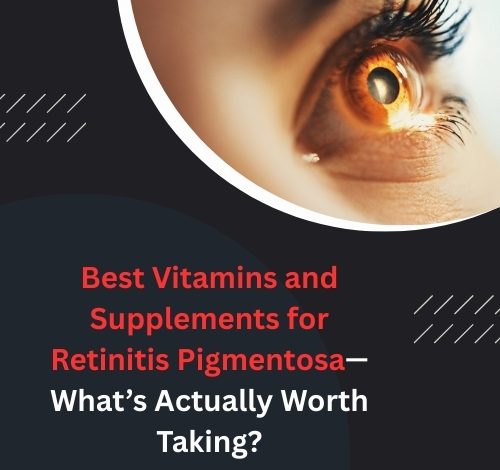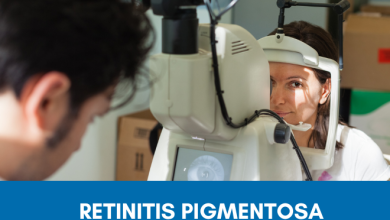Best Vitamins and Supplements for Retinitis Pigmentosa—What’s Actually Worth Taking?

Retinitis Pigmentosa is a group of rare genetic eye conditions that cause progressive vision loss. It primarily affects the retina—the layer of tissue at the back of the eye responsible for detecting light. As the condition advances, individuals may experience night blindness, loss of peripheral vision, and eventually, central vision loss.
While there’s currently no cure for Retinitis Pigmentosa, emerging research shows that certain vitamins and supplements may help slow down its progression and support overall eye health. The best vitamins and supplements for Retinitis Pigmentosa, including what’s backed by science and what may actually be worth taking. We’ll also touch on Herbal Treatment for Retinitis Pigmentosa as a natural, complementary approach.
What is Retinitis Pigmentosa?
Retinitis Pigmentosa (RP) is a group of rare, inherited eye disorders that cause the gradual breakdown of the retina—the light-sensitive tissue at the back of the eye. The retina is responsible for converting light into signals that are sent to the brain to produce vision. In people with RP, the retinal cells—especially the rod and cone photoreceptors—degenerate over time, leading to progressive vision loss.
Common Symptoms of Retinitis Pigmentosa:
- Night blindness – Difficulty seeing in low-light or dark conditions (often the earliest sign).
- Tunnel vision – Gradual loss of peripheral (side) vision.
- Light sensitivity – Trouble adjusting from bright to dim environments.
- Blurred vision – Vision becomes less sharp over time.
- Eventual central vision loss – In advanced stages, the ability to see straight ahead can be affected.
Is There a Cure?
Currently, there is no cure for Retinitis Pigmentosa. However, ongoing research is exploring treatments like:
- Gene therapy
- Retinal implants
- Stem cell therapy
- Nutritional support
- Herbal treatment for Retinitis Pigmentosa
Some patients use Retinitis Pigmentosa supplements, such as Vitamin A, lutein, and omega-3 fatty acids, to help slow progression and maintain eye health.
7 Vitamins and Supplements for Retinitis Pigmentosa
Retinitis Pigmentosa (RP) is a genetic eye disorder that gradually damages the retina, leading to vision loss. While there’s currently no cure, certain vitamins and supplements have shown promise in supporting eye health and slowing disease progression. Here are 7 vitamins and supplements for Retinitis Pigmentosa that are worth knowing about.
1. Vitamin A Palmitate
Vitamin A has long been studied for its potential role in slowing the progression of Retinitis Pigmentosa. Specifically, Vitamin A Palmitate has shown promise in some clinical trials. It supports the function of photoreceptor cells in the retina.
- Benefits: May slow the decline of retinal function.
- Note: High doses can be toxic, especially to the liver—only take under medical supervision.
2. Omega-3 Fatty Acids
Found in fish oil and flaxseed oil, omega-3 fatty acids support cellular health and reduce inflammation. A Harvard study found that combining omega-3s with Vitamin A could help slow vision loss in RP patients.
- Benefits: Supports retinal cell integrity and may protect against oxidative damage.
3. Lutein and Zeaxanthin
These carotenoids act as natural antioxidants in the eye, especially in the macula. Though not a cure, they help protect retinal cells from light-induced damage and oxidative stress.
- Benefits: Filters harmful blue light and improves visual performance.
4. Coenzyme Q10 (CoQ10)
CoQ10 is a mitochondrial antioxidant that supports energy production in cells—including the photoreceptors in the retina. Some studies show it may help preserve vision by preventing cell damage.
- Benefits: Boosts retinal cell energy and helps protect against degeneration.
5. Zinc
Zinc plays a crucial role in cellular repair and immune function. It also enhances the activity of other antioxidants like Vitamin A and E.
- Benefits: Supports enzyme function in the retina and may slow vision loss when used with other nutrients.
6. Alpha-Lipoic Acid (ALA)
ALA is a powerful antioxidant that helps regenerate other antioxidants in the body. It can help reduce oxidative stress, which is a key factor in retinal cell damage in RP.
- Benefits: Protects against nerve and retinal degeneration.
7. Herbal Treatment for Retinitis Pigmentosa
In addition to vitamins and minerals, many people are exploring Herbal Supplement for Retinitis Pigmentosa as a natural way to manage the condition. Herbal blends often include:
- Ginkgo biloba – Improves blood flow to the retina.
- Bilberry extract – Rich in anthocyanins that support night vision and retinal health.
- Turmeric (curcumin) – Has anti-inflammatory and antioxidant properties.
While scientific evidence is still emerging, these herbs are considered safe and may complement conventional and nutritional therapies when used responsibly.
Are These Supplements Worth Taking?
Yes—but with caution. While these supplements won’t cure Retinitis Pigmentosa, some can slow the progression and support visual health. Here are a few guidelines:
- Consult your eye doctor or specialist before starting any supplement, especially high-dose Vitamin A.
- Use a balanced combination of vitamins and antioxidants rather than relying on a single supplement.
- Track your progress with regular eye exams to monitor changes in your vision.
Final Thoughts
If you’re living with Retinitis Pigmentosa, managing the condition can feel overwhelming. But the right combination of nutrients, lifestyle changes, and medical guidance can make a meaningful difference. Vitamins like A, lutein, and CoQ10, along with omega-3s and herbal treatments, offer hope in preserving vision and improving quality of life.
As science continues to advance, combining both modern supplements and Herbal Treatment for Retinitis Pigmentosa may prove to be the most effective strategy in slowing down the disease’s progression naturally and safely.




